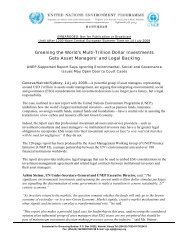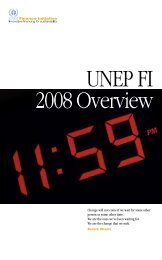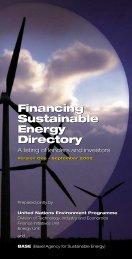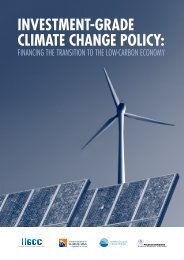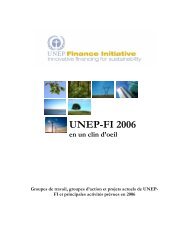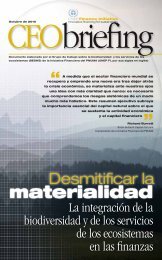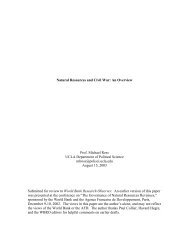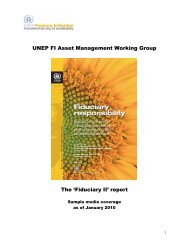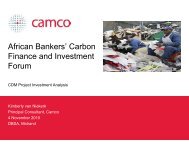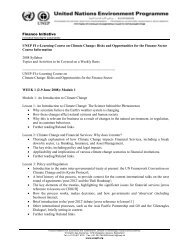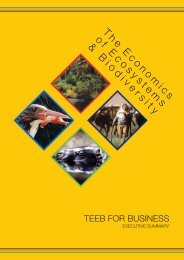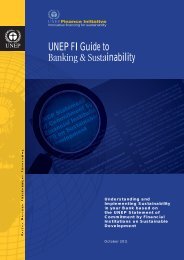Carbon 2009 Emission trading coming home - UNEP Finance Initiative
Carbon 2009 Emission trading coming home - UNEP Finance Initiative
Carbon 2009 Emission trading coming home - UNEP Finance Initiative
You also want an ePaper? Increase the reach of your titles
YUMPU automatically turns print PDFs into web optimized ePapers that Google loves.
<strong>Carbon</strong> <strong>2009</strong><br />
a total breakdown of the UNheaded<br />
negotiations will not<br />
affect the EU policy. We will now<br />
look into the expectations of the<br />
respondents on the post-2012<br />
framework.<br />
4.2 Towards Copenhagen<br />
The first year of the Kyoto<br />
commitment period is now behind<br />
us and the Copenhagen deadline<br />
only roughly nine months ahead.<br />
The Bali mandate commits all the<br />
UNFCCC members to produce<br />
a comprehensive climate deal<br />
before the end of <strong>2009</strong>, and we<br />
have asked respondents whether<br />
they think that will happen or<br />
not, and what they expect the<br />
agreement to entail.<br />
Figure 4.2: Are you in or are you out?<br />
“Which countries do you think will participate in a post-2012 scheme with<br />
quantified commitments?” Respondents who expect global agreement in <strong>2009</strong>.<br />
Note: Brazil and South Africa not included in 2007 and 2008; Mexico included 2008.<br />
N =1657 (<strong>2009</strong>)<br />
European Union<br />
Japan<br />
Australia<br />
New Zealand<br />
Canada<br />
United States<br />
South Korea (ROK)<br />
Russia<br />
Ukraine<br />
South Africa<br />
Mexico<br />
Brazil<br />
Sectors in developing countries<br />
China<br />
India<br />
<strong>2009</strong><br />
2008<br />
2007<br />
Fewer respondents<br />
expect an agreement<br />
in Copenhagen<br />
Only three meetings, including<br />
the COP15 in December, are<br />
planned for <strong>2009</strong> (see Table 1).<br />
In the corridors in Poznan, there<br />
was mention of one or several<br />
additional meetings, but this has<br />
not been confirmed so far. The<br />
meeting in late March could bring<br />
more clarity on this issue. Any<br />
additional meeting would take<br />
place in the summer or autumn.<br />
Share of respondents<br />
Source: Point <strong>Carbon</strong><br />
Since last year, the share of<br />
respondents expecting an<br />
agreement to be reached in <strong>2009</strong><br />
has fallen from 71 percent to 59<br />
percent, see Figure 4.1. The share<br />
had been stable at 71 percent in<br />
2008 and 2007. Accordingly, the<br />
share of respondents answering<br />
“no” has doubled, up from 11<br />
percent last year to 25 percent<br />
now. The slow progress in<br />
the post-2012 negotiations in<br />
2008, combined with the global<br />
economic slowdown, may be the<br />
main reasons for this change.<br />
Table 1: UNFCCC negotiation meetings in <strong>2009</strong> for a post-2012 framework<br />
Date Venue Meeting<br />
29 March - 8 April Bonn AWG-KP 7 and AWG-LCA 5<br />
1 - 12 June Bonn AWG-KP 8 and AWG-LCA 6,<br />
SBSTA and SBI 30<br />
7 – 18 December Copenhagen COP-15/CMP-5 and sessions of<br />
the subsidiary bodies<br />
0% 20% 40% 60% 80% 100%<br />
Of US respondents, only 54<br />
percent believe an agreement will<br />
be reached in Copenhagen, which<br />
compares to 75 percent last year;<br />
while 32 percent think not. The<br />
share of “post-2012 optimists”<br />
reaches only 50 percent in Japan<br />
and Australia, two countries<br />
that we expect to follow the US<br />
negotiating position. For Japan,<br />
this share is markedly down<br />
compared to 2008, when it<br />
reached 80 percent. The gravity<br />
of the economic recession in<br />
Japan and the US could explain<br />
these drops in the confidence<br />
that a post-2012 agreement will<br />
be reached.<br />
The countries with the highest<br />
share of “post-2012 optimists”<br />
are the biggest developing<br />
countries and some EU countries.<br />
For instance, in Spain, India,<br />
Brazil and Germany, respectively<br />
76, 70, 68 and 68 percent of the<br />
respondents answered yes to this<br />
question. Among respondents<br />
32<br />
All rights reserved © <strong>2009</strong> Point <strong>Carbon</strong>




